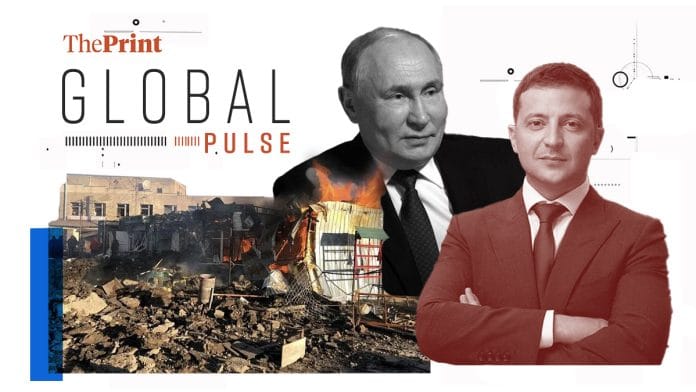New Delhi: Hours before peace talks in Turkey were set to begin, war-ravaged Ukraine struck at key Russian air-bases Sunday. The attack has been described as one of the “most penetrating assaults of Russian territory by Ukrainian forces since the war began”.
The operation, titled Spiderweb, took 18 months of preparation and was personally supervised by Ukrainian President Volodymyr Zelenskyy. Explosives were smuggled in, hidden, and then remotely opened—which was when the attacks commenced, reports The Washington Post.
“The attacks may have dealt a significant blow to Russia’s aerial cruise missile strike capability, revealing the vulnerability of major military assets thousands of miles from the front lines. They have also exposed weaknesses in Russia’s powerful security apparatus to prevent sabotage operations deep within its territory,” notes The Post.
Also in The Washington Post, Max Boot writes that Ukraine has “rewritten” the rules of war, comparing Russia’s position to the US after Japan’s attack on Pearl Harbour during World War II.
“Operation Spiderweb will not be a decisive blow against the Russian military any more than the Pearl Harbor attack was a decisive blow against the US military. But just as Pearl Harbor signaled that Japan would be a far more formidable foe than most Westerners had expected, Sunday’s attack shows, yet again, that the Ukrainians are proving far more resilient and adaptable fighters than anyone had anticipated before the start of Russia’s full-scale invasion more than three years ago,” says the opinion columnist.
The New York Times notes that the attack marks a significant first—since 2022, Ukraine has never been able to strike Siberia.
“The Olenya base in the Murmansk region, which also came under attack, is one of Russia’s key strategic airfields, hosting nuclear-capable aircraft,” says a report.
Meanwhile, in an explainer, The Guardian looks at the resignation of the commander of Ukraine’s land forces, following the death of 12 soldiers killed in a Russian strike.
“This is a conscious step dictated by my personal sense of responsibility for the tragedy at the 239th training ground, which resulted in the deaths of our soldiers,” the commander wrote on Facebook. An earlier statement from the land forces’ Telegram page said 12 soldiers had been killed and 60 wounded by a Russian missile strike on a military training site, the latest in a string of similar attacks,” says the report.
According to The Guardian, Ukraine has also said that it has destroyed 7 billion dollars worth of Russian war infrastructure.
The BBC assesses the “sheer audacity” of the attack which has sent shockwaves across the globe and could mark a critical turning point in the war.
“Despite Russia’s slow, inexorable advance through the battlefields of the Donbas, Ukraine is telling Russia, and the Trump administration, not to dismiss Kyiv’s prospects so easily,” says the BBC.
However, as seen in Al Jazeera, according to Russia’s TASS news agency, there were no “no military or civilian casualties.” Some “participants” have also been detained.
Video footage accessed by The Financial Times shows the extent of the attacks, which shows a Russian airfield “in flames” and evidence of drones attacking several planes.
“At this point, more than 40 aircraft have reportedly been hit,” an official tells the British newspaper, adding that “drones struck four Russian military airfields in ‘one co-ordinated operation’ thousands of kilometres away from the front line”.
Russia’s state-sponsored RT analyses what the strikes signify: Ukraine’s attempt to reorient the narrative in favour of itself, a last-ditch effort to save face in a losing battle.
“Whether Sunday’s airbase attacks mark another such pivot remains to be seen. But the pattern is familiar: a dramatic gesture aimed at reshuffling a strategic deck that’s increasingly stacked against Ukraine,” writes Sergey Poletav, an information analyst and publicist.
Similar to the BBC, The Economist also highlights what this audaciousness on part of Ukraine could mean for the world at large.
“A senior Ukrainian official acknowledged that the operation carried risks of turning Western partners away from Ukraine. ‘The worry is that this is Sinop,’ he said, referring to Russia’s strike on an Ottoman port in 1853 that ended up isolating the attacker on the world stage,” notes The Economist.
(Edited by Zinnia Ray Chaudhuri)
Also read: How China found validation in India-Pakistan conflict, and the high stakes world of political comedy






